So you wonder if you’re ready to have a dog. First, we have to commend you for taking the commitment so seriously that you are diligently researching the subject. Most people get so excited over a cute little face but often fail to see the long-term repercussions of owning a dog.
While it certainly has its upside, there are a lot of aspects of owning a dog that many people talk about. It’s hard work! You emotionally, physically, and financially have to be involved. Not to mention, dogs can cost you a lot of money in vet visits and home repairs if you have a particularly destructive pooch on your hands.
In this article, we aim to go over all of the good, bad, and ugly of dog owning. Hopefully, by the end, you’ll be able to make a fantastic decision.

The 7 Questions to Ask if You Are Ready for a Dog
1. Do You Have the Time for a Dog?
Dogs require a lot of time! Even dogs that are pretty lazy still need daily exercise, attention, and routine care. There’s no such thing as having a low-maintenance dog. They all require you the same capacity as a small child, to a degree. While it obviously has its differences, it still requires a level of commitment.
You have to be able to walk, feed, play with, and socialize your dog. Sometimes it’s not just about the time you’re directly spending with them, but it’s getting them used to things like going to the groomer, vet, dog park, and on other outings.
When you get home from work, it isn’t time to take a snooze or chill out on the couch, it’s time to take your dog for their daily walk. So, for some, this is going to be a pretty smooth, easy transition, but for others, it might be more effort than what you have the capacity to put in at this moment.

2. Are You Prepared for a Dog’s Energy?
You’re going to need quite a bit of energy to keep up with any dog. They will happily greet you in the mornings, ready for their walk. They will sit patiently at the door, awaiting an invitation for a car ride, and they will sit beside you, as you cozy up on the couch, waiting to join you.
Basically, your dog is going to want to interact as much as possible, and it’s going to require a lot of energy on your part. You may want a dog that will be a shadow, constantly connected to you.
But you might find that you actually need a little space. Do you know yet how you feel constantly having your space invaded? If you’re not sure how you would respond to that, it might not be quite yet time to get a dog.
You can’t get a dog to put them in a kennel all day and expect them to be well-behaved, relaxed, and capable of being calm. Most dogs require a minimum of at least an hour of exercise per day.
Some dogs require slightly less than this, while other dogs require up to two hours or more. If you don’t think you can accommodate them, it’s best to avoid getting a dog until you can.
3. Are You Financially Prepared for a Dog?
Owning a dog is not cheap! You’ve probably thought of basic things, such as making sure they have enough food to eat. But that’s not where it ends! Dogs require much more than just food.
They need constant supplies, potential grooming, care, boarding costs, and a laundry list of other aspects that you might not think of initially. So do you actually have the finances to manage it?
Here are some aspects of care that are non-negotiable:
Nutrition
Your dog requires quality nutrition. It might be easy to go to the dollar store and buy cheap dog food with questionable ingredients. But ultimately, your dog needs a more well-rounded recipe that will give them the nutrients they require.
You can choose from dry kibble, wet canned food, or fresh dog food. Some families also will make their dog foods either lightly cooked or raw. We highly recommend choosing the method of your choice after speaking with a veterinarian.
On average, a pup parent spends roughly $600 a year on dog food and treats.
If you need to speak with a vet but can't get to one, head over to PangoVet. It's our online service where you can talk to a vet online and get the personalized advice you need for your pet — all at an affordable price!

Exercise
You are going to need to buy supplies for exercise. Plus, you might have to get memberships to dog parks, doggy daycares, and all things pooch related.
You will also need to have certain supplies on hand to make sure they can exercise appropriately. This includes items like harnesses, leashes, travel bowls, poop bags, and fresh water.
Enrichment
Your dog is going to need to stay busy! You can get them a series of toys to enjoy. Some dogs prefer very high quality chew toys while others prefer having a soft little squeaker they can snuggle up with.
Some dogs like a variety, playing with different things at different time. Ultimately, you’re going to know your dog best, and you can make a decision with purchases accordingly. If you don’t give your dog the appropriate materials to chew on or play with, they will find other things in your house to fill this desire.
That means they could destructively chew on furniture, trim, and carpet, and destroy your belongings. Instead of having to deal with all of that, you should make sure your dog is well satisfied.
Vet Care
Every dog needs vet care! From the time you bring your dog home until they pass away, they will need regular checkups and routine treatments with their personal veterinarian. They will get to know them quite well in the first year and visit them annually thereafter.
Your dog might require more care in this category if certain health issues develop. Sometimes it’s hard to foresee certain health issues that will crop up in the breed, particularly if they’ve never been genetically tested.
But illness can arise from many more causes than just genetics. Dogs can be susceptible due to environment and diet as well. Many pet parents are opting for pet insurance to take the bulk of the responsibility.
Vet care is getting increasingly expensive and having measures put in place to protect you and your dog in times of financial distress or emergency is a must. If you do get a dog, we highly recommend looking at affordable insurance plans to keep your dog healthy.
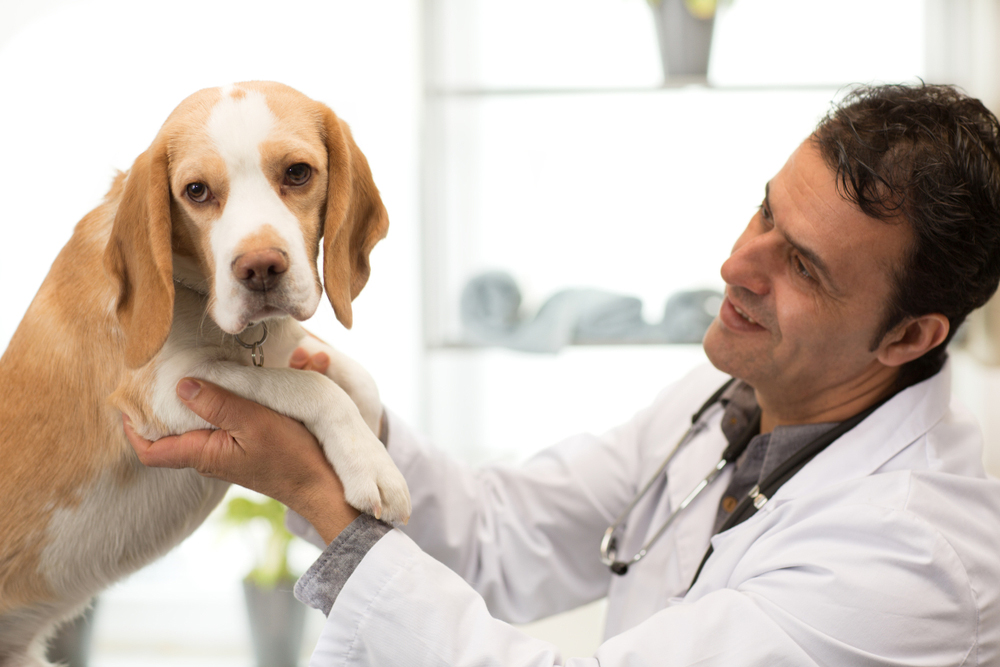
Supplies
You need all sorts of supplies for your dog. They will require a laundry list of items, some of which you only have to purchase once, others are repetitive. Here are a few supplies you’ll need:
- Leash
- Harness
- Food bowls
- Waterers
- Backpacks
- Dog beds
- Puppy pads
- Poop bags
And the list goes on. You can stay as basic or get as intricate as you want in this category.
4. Do You Have Adequate Space for a Dog?
Every home is set up different. Some are very spacious with hardwood floors, making potty messes easy to clean up in the beginning. There’s lots of room for dogs to roam and explore, so they can easily get out energy both inside and out of the house.
Other homes are equipped with a large fenced-in backyard your pup can explore when they’re feeling bored. However, some people have very tight living quarters, such as a very small apartment or condo.
If you don’t have the room outside to let your dog explore on their own, you’re going to be 100% responsible for entertaining them. That means you will have to anticipate longer walks, games of fetch, and other shenanigans.
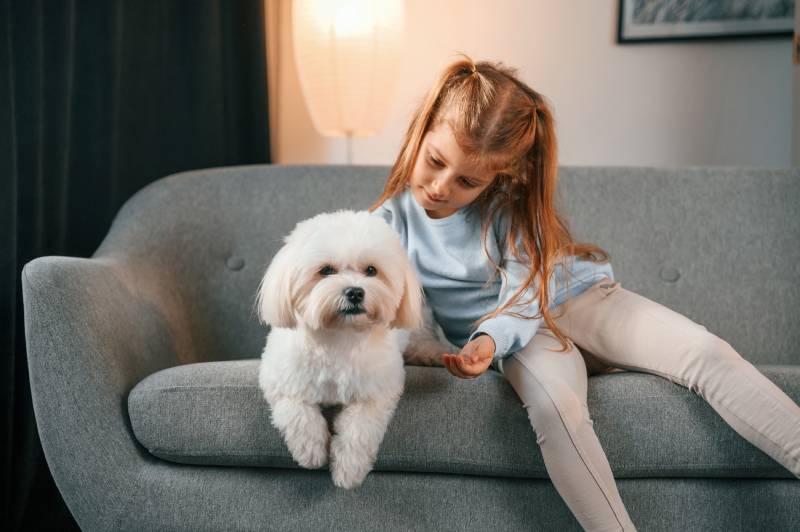
5. Does Your Living Situation Make Sense?
Certain dogs might be able to fit into this atmosphere without much of an issue, but it will be completely insufficient for others. For example, if you have a very relaxed breed like a Havanese, you might have a best buddy that follows you around like a shadow.
But, if you have a more high-energy dog like a German Shepherd or Belgian Malinois, they might wreak havoc on your home keeping themselves entertained. You can see how these two types of dogs could require substantially different environments.
Before you get a dog, it’s important that the type of breed you’re getting is compatible with your particular living situation at the time. Many people also buy dogs that are on banned breeds lists and then have to rehome them later.
Everyone has a unique living situation. You might live in a condo, small apartment, or share a home. It is important to have great communication and ask landlords or property owners what their policies are before committing.
Also, these places often have restrictions and require you to meet other qualifications to have a pet. Some breeds are frowned upon or banned due to the potential for aggression and overall liability.
6. Can You Keep Up with Registration?
Dogs require their owners to keep up with their registration and tags. Every year, your dog will get their tags renewed. Most of them also require proof of vaccination, particularly with rabies. If your dog ever gets loose, it’s important for whoever finds them to know that they are completely up to date on shots and do not pose a bite risk to other folks.
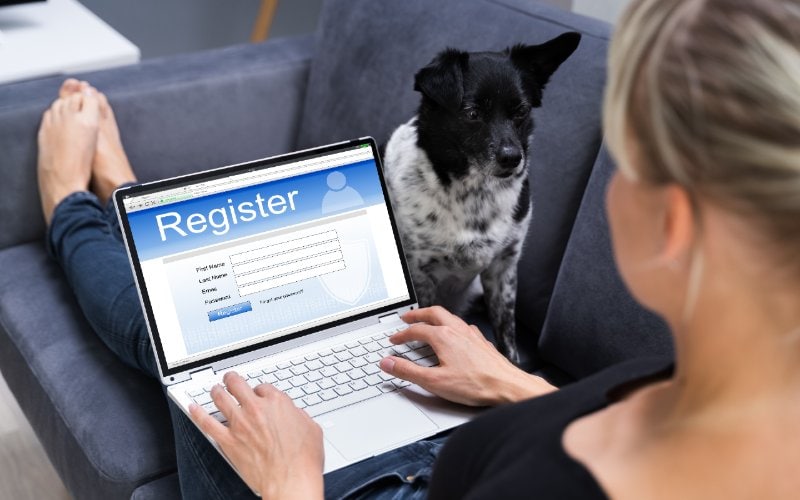
7. Can You Socialize Your Puppy Appropriately?
Puppies require socialization from the beginning. It is incredibly important that they develop bonds and connections early on so they know how to navigate them later in life. You’ll want your dog to get used to as many new faces, both furry and human, as possible.
Some dogs can develop aggressive tendencies when they’re older, including same-sex dog aggression. These issues should be closely monitored no matter what. However, those behaviors might be less likely to develop in dogs who have been appropriately exposed to a variety of situations.
Be prepared to take your dog to dog parks, nature parks, campgrounds, barbecues, you name it.

Buying vs. Adopting
If you decide that you’re ready to get a dog right now, it is important to ask yourself a few questions. The primary one is do you plan on buying or adopting the dog? There are pros and cons to each side of this question, so we’re going to divvy out for you.
Buying
- Authentic breeding
- Specific character traits
- Raising the dog from a puppy
- Kennel club-approved status
- Can be expensive
- Doesn‘t solve pet homelessness
- Could run into backyard breeder or puppy mill situations
Buying a dog from a licensed breeder is a great way to get a solid specimen from that particular breed category. If you have a strong love for a particular type of dog, or certain breed characteristics really stand out to you, you might want to get a purebred.
Plus, when it comes to compatibility, you are able to pinpoint the type of dog that would best suit your lifestyle. So you already have the upper hand knowing they’re naturally going to be inclined to be more energetic, playful, affection, protective, or whatever other qualities you’re looking for in a dog.
Adopting
- You’re reducing homelessness
- Less costly
- Vet care is finished upon adoption
- You can explore compatibility
- Sometimes unpredictable
- Less focuses
There are several perks of adopting over buying. First of all, you’re going to save a substantial amount of money. When you get a dog from a shelter, the vets will already have examinde them and make sure that they were microchipped and spayed and neutered.
Those are all expenses that you don’t have to put into it, and adoption, no matter the method, costs a fraction of what buying a dog outright does. You can also do lots of meet and greets and in-home evaluations to ensure that you and the dog that you want to bring home are completely compatible before committing.
This will alleviate a lot of the headache of potential conflicts of personality. However, dogs from shelters have an unknown origin most of the time. It’s hard to see just how much trauma or unpredictability you will get with a dog until you are truly living with them. Also, if you’re wanting a particular breed, getting a mixed dog does not guarantee the traits of one particular parent.
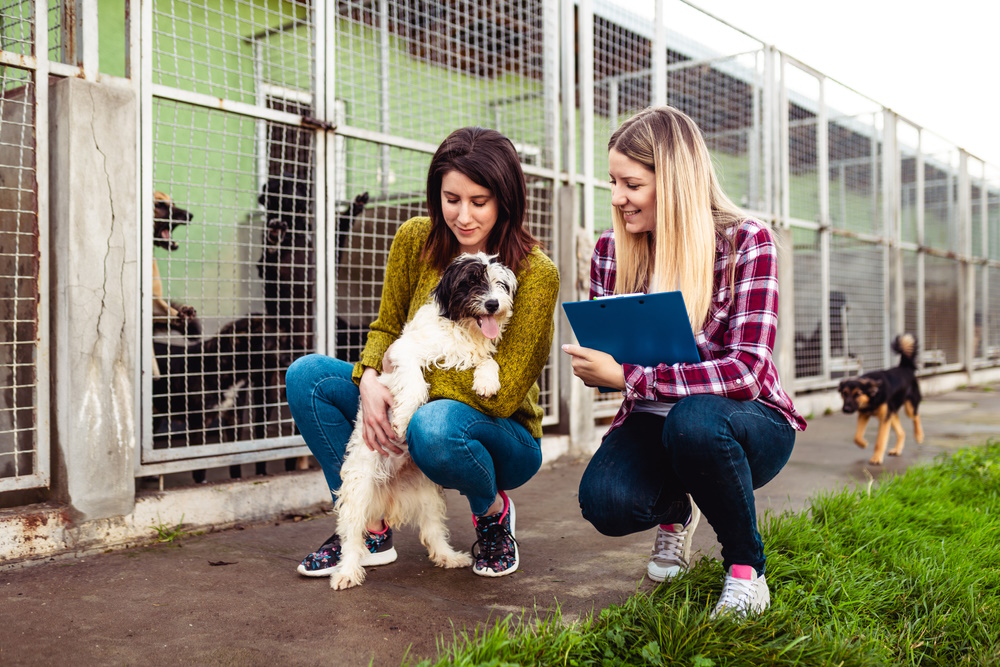
Fostering
If you aren’t quite ready to own a dog, there’s no reason to worry! You can prepare yourself in other ways. One of the methods that might work is fostering. Rescues and shelters constantly seek willing people to share their homes with homeless pets until someone adopts them.
This will give you a chance to see what it’s really like to have a dog in your home without binding you to a commitment. Who knows! You might even start to foster, fall in love, and wind up keeping the dogs that you were caring for.

In Conclusion
Ultimately, only you can decide if you want to get a dog at this moment in your life. We highly recommend that you make the best decision based on your current situation to prevent rehoming your dog for any reason.
If you’ve gone through this list of questions and have realized that you are more ready than you thought to get a pup, remember to buy responsibly no matter how you get your dog. Also, remember to steer clear of online ad sites to avoid potential backyard breeders and puppy mill situations.
See also:
- How to Convince Someone to Get a Dog: 9 Vet-Approved Tips
- How to Convince Someone to Get a Dog: Vet-Reviewed Tips & Considerations
Featured Image Credit: Ovchinnikova, Shutterstock
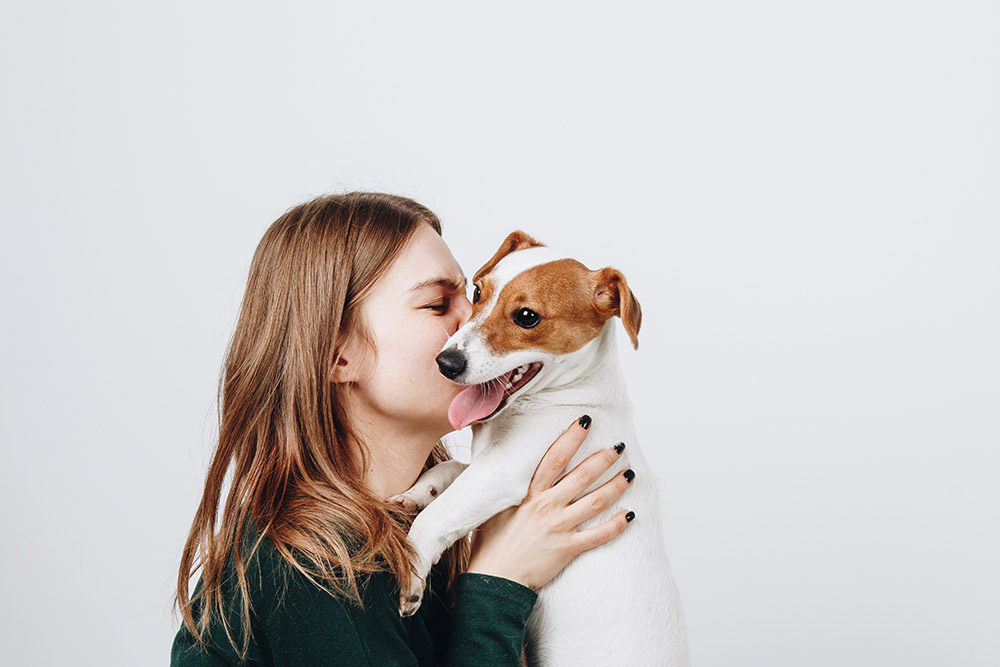






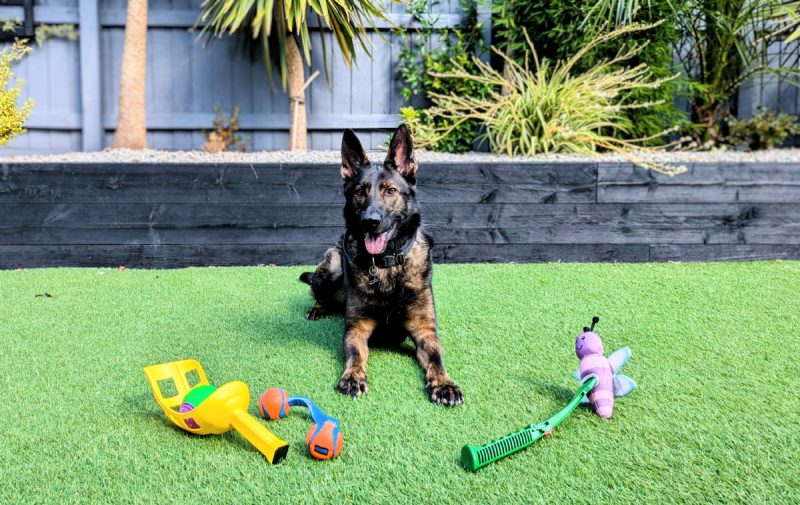










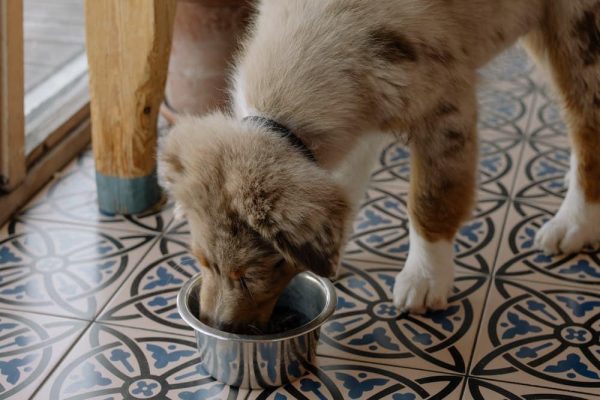

2 Responses
Hi everyone cats are better!! ! So make better choices!
Hello Siddharth,
I must admit you have some courage writing this on the site for dog lovers 😀 Let's agree that both dogs and cats have their pros and cons and each of them suits different people 🙂